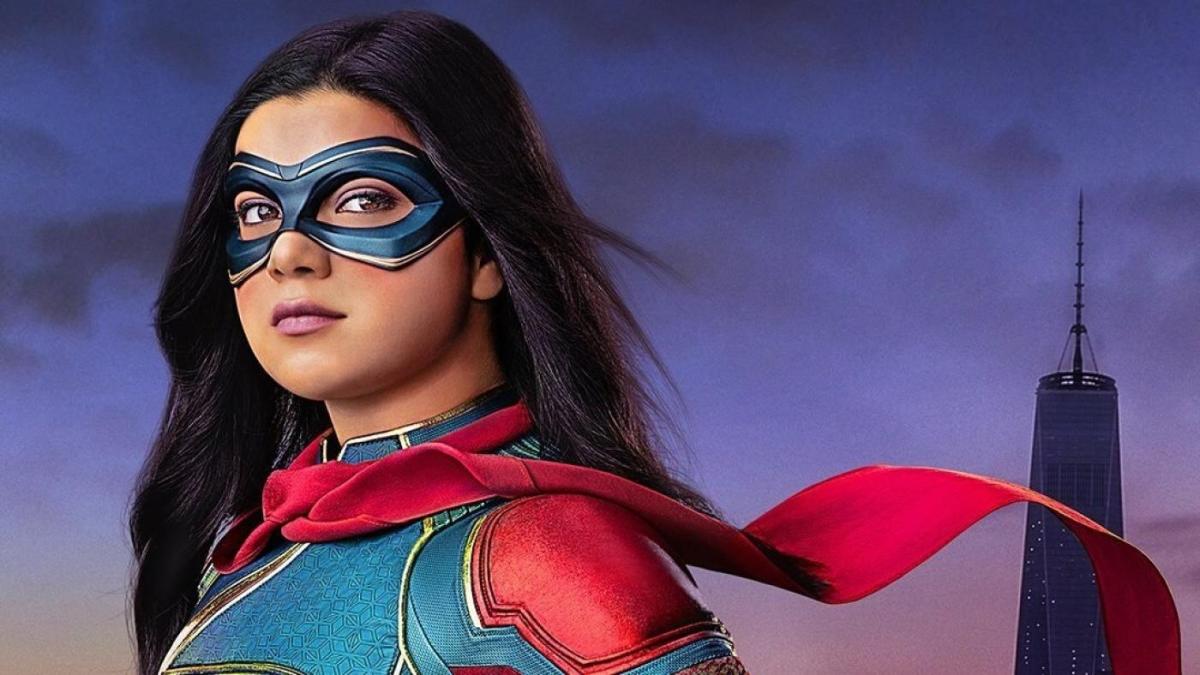Post Avengers: Endgame, the Marvel Cinematic Universe has plunged headfirst into the world of television, starting with WandaVision last year. Shows like Hawkeye revisited familiar supporting characters and fleshed out their stories, while shows like Moon Knight introduced us to completely new heroes. The latest in this lineup is Ms. Marvel.
Kamala Khan (Iman Vellani) is a Muslim teenager living in Jersey City. Coming from a Pakistani migrant family with traditional values, her caring but strict parents don’t particularly love her superhero obsession. Kamala is an unabashed fangirl when it comes to Captain Marvel, but her wild imagination makes her feel like she doesn’t quite fit in. While looking through her Nani’s old belongings, Kamala finds a bangle that unlocks powers within her.
Authenticity
As a young woman living in a multicultural Melbourne, I instantly clicked with this series and felt the authenticity of its setting. I related to Kamala – her insecurities, tribulations, Gen Z influences, pressure from her family – as well as her surroundings. Her best friend Bruno Carrelli (Matt Lintz) is a second-generation Italian-American, and her other friends are all from different ethnicities and backgrounds.
World reflective diversity in a TV show? Who would have thought! It also happens that Ms. Marvel has all the action, adventure and humour associated with Marvel’s best work.
So, it was absolutely no surprise to me when the series got torn to shreds by angry Marvel fanboys. Review bombed on IMDb, this minority were quick to call the series ‘childish’ and ‘woke’ as they tended to their damaged masculinity. This criticism has come to be expected when any large franchise has diversity (Star Wars is an example), but this particular reaction had me in deep thought.
Read: Thor: Love and Thunder review – there’s plenty to enjoy
Yes, Ms. Marvel has a lot of firsts for the MCU and is certainly groundbreaking for a superhero story, but the premise and bones of the series itself are also incredibly simple – and when you really think about it, not all that groundbreaking. Essentially, the series can be looked at in two ways.
Muslim superhero
It has to be acknowledged that the fact that Kamala is Marvel’s first on-screen Muslim superhero is a pretty big deal. Marvel seems to have come a long way from billionaire playboy Tony Stark. Sure, we got Black Panther and Shang-Chi, but Kamala’s roots are woven into her identity in a way we haven’t seen before.
As a teenager, Kamala’s family and culture are a massive part of her life. She goes to the mosque to pray, she attends traditional culture, and has to deal with her overly protective but well-meaning family. Anyone with an ethnic background will be able to relate to their dynamic, from the clashes to the support system they provide for each other.
The series also cleverly takes Kamala’s cultural history and uses it as a key element and turning point in the narrative – in this case the Partition in 1947, which saw British India divided into the independent dominions of India and Pakistan.
Read: Doctor Strange in the Multiverse of Madness review: nearly magic
There began one of the largest migrations in history, and left millions of people displaced and killed. In Ms. Marvel, Kamala’s Nani left India during Partition, where Kamala’s great grandmother disappeared and her Nani was almost separated from her father at the train station – but was led back to him by a trail of stars.
In Episode 5, Kamala is transported back to this night to discover that it was she who reunited her Nani with her father, and those stars came from her. Through this plotline, the show depicts true events with a fictional touch, giving viewers like myself an important history lesson and doing so with sensitivity.
Superhero
And so, an unlikely hero discovers they have superpowers, faces villains and threats while going on a journey of self discovery, and comes out triumphant on the other side – usually after an action packed and debris filled final battle.
On a storytelling level, there’s nothing particularly new and it even draws comparisons to the MCU’s Peter Parker. The coming of age elements are fairly standard too – first crushes, breaking away from family, school, social media and so on.
Reviewers may claim the series is nothing more than a display of political correctness on Marvel’s part, but what’s so ‘woke’ about it? There’s a teenage girl and she’s Muslim. That’s nothing out of the ordinary, that’s real life. Plus, the show’s representation doesn’t get in the way of it delivering all the superhero goods audiences know and love. If anything, it enriches it.
Ms. Marvel is currently screening on Disney+.





